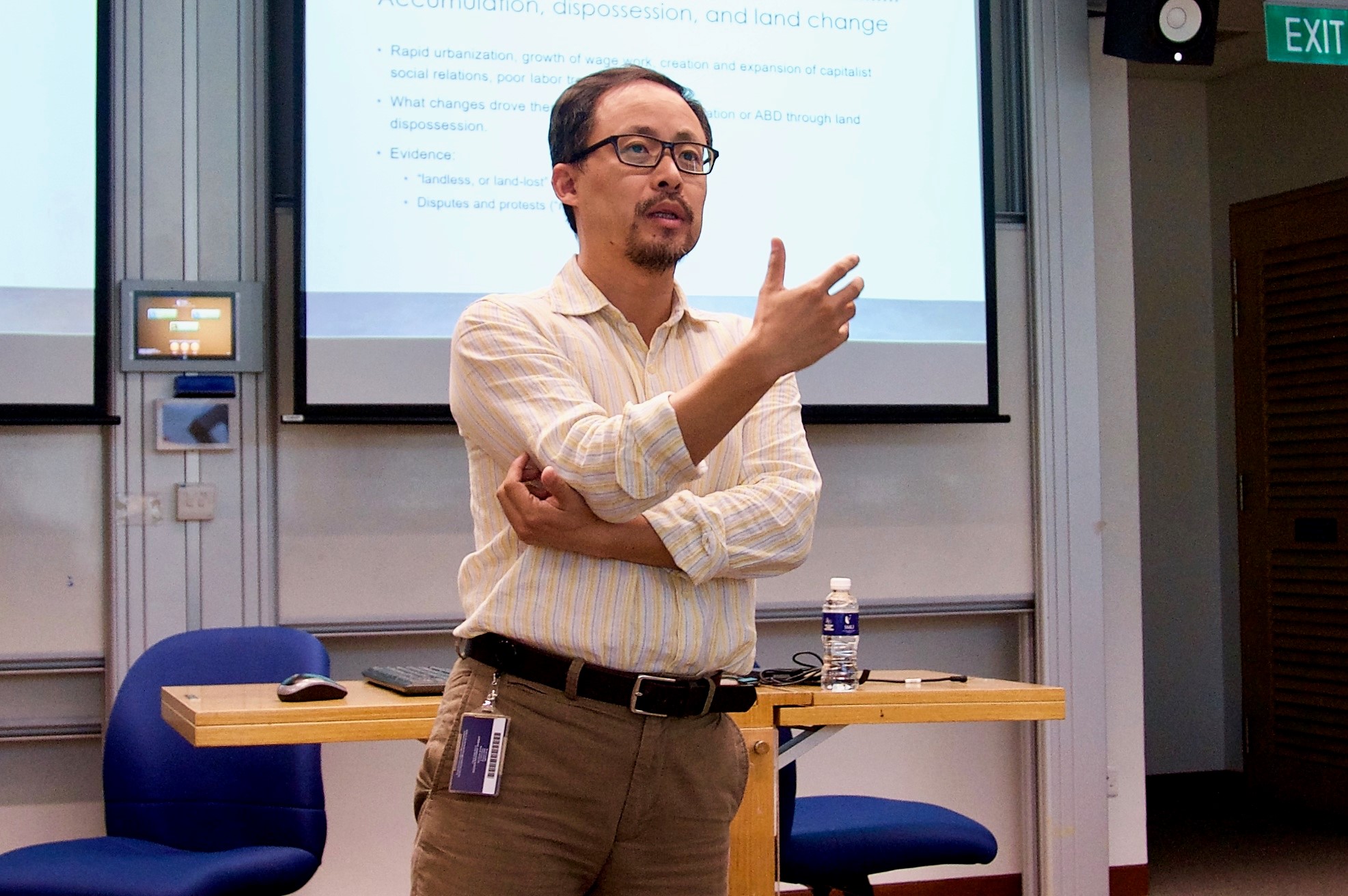
Above: Associate Professor Qian Forrest Zhang of the Singapore Management University School of Social Sciences speaking at the Singapore Land Workshop.
By Sim Shuzhen
SMU Office of Research & Tech Transfer – On a typical map, boundaries between countries, states, cities and communities are often depicted as reassuringly well-defined lines. In reality, however, the concept of land is seldom as clear-cut.
As countries urbanise and seek to use land for economic development, disputes naturally arise over issues such as ownership, compensation and the environment. In addition to the physical, land issues also cross over into the socio-political arena, tying into history, memory, politics and economics.
In rapidly developing China and India, land deserves special attention. At the Singapore Land Workshop, held at Singapore Management University (SMU) from 28-29 July 2018, a diverse group of scholars – including sociologists, political scientists and geographers – gathered to discuss their work on land issues in these two emerging economies. The workshop was co-organised by SMU and Johns Hopkins University, US, with funding support from the American Council of Learned Societies and the Chiang Ching-kuo Foundation.
Adding nuance to dispossession
The dominant discourse surrounding land issues in China centres on rural residents who are dispossessed of their lands by local governments or other authorities. In this discourse, rural residents are portrayed as victims whose rights are violated and livelihoods taken away in the name of economic development.
Although such cases undoubtedly exist, this picture is oversimplified, argued Associate Professor Qian Forrest Zhang of the SMU School of Social Sciences in his talk, ‘Varieties of “Land Grabs” in Rural China: Institutional Logic and Political Dynamics’. In reality, the conditions surrounding land acquisitions – such as residents’ compensation, bargaining power and socioeconomic status, as well as the flexibility of the authorities – can vary greatly, he said.
To get a better handle on the complexities of land dispossession, Professor Zhang advocates a more nuanced study of its many different varieties. “I want to look at the different types of land loss, and to consider in a more disaggregated way to what extent they can be conceptualised as dispossession, and in which cases they cannot [be classified as such],” he explained.
For example, rural residents have sometimes been handsomely compensated for their land by massive state-owned companies, allowing them to purchase other residential properties or businesses. “This provides [residents] with a new stream of income, rental income or business income. So in those cases, you could argue that it does not constitute land dispossession,” said Professor Zhang.
In addition, while some residents do become displaced and have their lives disrupted, others have been relocated to more desirable areas with more job opportunities, and have even been provided with much-coveted household registrations (hukou) such as those from Shanghai, added Professor Zhang.
Further, confrontations between rural residents and the authorities concerning land merit more careful analysis, continued Professor Zhang. While violent protests staged by some desperate rural residents facing dispossession often command global attention, not all protests are aimed at halting land expropriation. In some instances, residents actually want the land expropriation to go ahead, and are merely trying to negotiate more favourable compensation, he said.
Thus, land changes are highly variable and do not always subject rural residents to severe deprivations, said Professor Zhang. “I want to bring more clarity to the concept of dispossession, especially in the Chinese context. I think it is more fruitful for us to use the term more narrowly and more clearly,” he emphasised.
Life in the Amoebal Zone
When studying land transitions, scholars often focus on the process of transition and not on the land itself, said Oxford University Associate Professor Nikita Sud, speaking after Professor Zhang. “[Yet] I think the nature of land is deeply tied into the politics-making, state-making and market-making that go together with land transitions,” she said in her talk, ‘Making the Political, and Doing Politics, around Unfixed Land in an Amoebal Zone in India’.
Professor Sud has carried out extensive fieldwork in the Gujarat Special Economic Zone in India, where various groups including farmers, fish workers, salt workers and local politicians are often at odds with the state and large industry players over land. The region has varied so greatly in size and purpose over the past few decades that Professor Sud has termed it the Amoebal Zone (AZ).
A defining feature of the AZ is the unfixity of its land, said Professor Sud. The AZ constantly changes materially – estuaries are filled in and dunes levelled to create land for operations such as mining and ship-building, for example. Conceptually, the AZ is fluid as well – some groups speak of the land as a mother, a provider and a store of history and memory, while others view it as ‘wasteland’ that needs to be developed before it can be useful.
This unfixity has profound implications for politics in the AZ, said Professor Sud. “Just as this land is many things to many people, the politics around it is also a malleable, burgeoning entity… it is very much fought over the nature of the land.”
The protests that arose in 1992, when a foreign multinational was granted land in the AZ to build a salt manufacturing facility, are a good example of this. “One of the initial arguments against [the facility] took on board the memories and history of the land connected to India’s freedom struggle, where Gandhi had famously broken British salt laws. Those memories were used to say a foreign company cannot come here – we will again use Gandhian methods of protest to oppose it,” said Professor Sud.
In addition to these larger-scale protests, the nature of land also factors into the ‘everyday’ politicking and manoeuvring in the AZ among players such as land brokers, land speculators and contractors, added Professor Sud.
Like Professor Zhang, Professor Sud argues that the dominant narrative of the rich dispossessing the poor is inadequate for capturing the complexity on the ground. “I think we have varying strands unfolding… I’m very uncomfortable with the narrative where there is accumulation by dispossession and that’s the end of the story. I think we do our field sites injustice by just following that narrative – we need to vary that story based on what we’re seeing,” she concluded.
Back to Research@SMU Issue 58
See More News
Want to see more of SMU Research?
Sign up for Research@SMU e-newslettter to know more about our research and research-related events!
If you would like to remove yourself from all our mailing list, please visit https://eservices.smu.edu.sg/internet/DNC/Default.aspx

